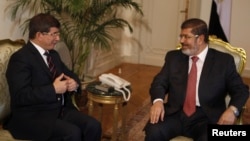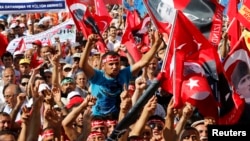ISTANBUL —
Turkish Foreign Minister Ahmet Davutoglu on Thursday said the army's overthrow of Egyptian President Mohamed Morsi was a "military coup", and "unacceptable".
"The removal of President Mohamed Morsi, who came to power through a democratic election, by the intervention of the Egyptian army is an extremely worrying situation," Davutoglu told reporters in Istanbul.
"Leaders who come to power with open and transparent elections reflecting the will of the people can only be removed by elections, that is, the will of the nation," he said. "It is unacceptable for a government that has come to power through democratic elections to be toppled through illicit means and, even more, a military coup."
The response by Turkey's government, which like Morsi's Muslim Brotherhood has Islamist roots, appeared to be the strongest foreign reaction so far to Morsi's overthrow.
The United Nations, the United States and other powers have stopped short of denouncing the move as a military coup; to do so might trigger automatic sanctions.
Deputy Prime Minister Bekir Bozdag said the coup had destroyed Egypt's fledgling democracy and national will, and hit out at the responses from Western capitals.
"There are no opposing statements from the West ... which always advocates democracy, national will, human honor and freedoms. Where is the sincerity?" Bozdag tweeted.
Turkey was rocked by weeks of its own protests last month when a small effort to save an Istanbul park from redevelopment mushroomed into a mass demonstration by tens of thousands of people opposed to what they see as Erdogan's authoritarian rule.
While those protests were dwarfed by the millions of people who have taken to the streets in Egypt this week, they were the biggest public challenge to Erdogan's 10-year rule.
Erdogan, who has so far remained silent over the recent unrest in Egypt, has dismissed protesters at home as pawns of Turkey's enemies and said they were manipulated by "terrorists".
Erdogan was due to discuss Egypt with Davutoglu and other officials later on Thursday.
Turkey's response is at least partly shaped by its own. history of having experienced military coups in 1960, 1971 and 1980.
In 1997, Turkey's first Islamist government, led by Necmettin Erbakan was also pushed from power by the army in what was widely dubbed a "post-modern coup".
Erdogan's AK Party, founded in part by members of Erbakan's Welfare Party after it was outlawed, has sharply curbed the influence of the military since coming to power in 2002.
Last month, Ankara moved to amend an article of the armed forces charter cited by generals in the past to justify coups.
"The removal of President Mohamed Morsi, who came to power through a democratic election, by the intervention of the Egyptian army is an extremely worrying situation," Davutoglu told reporters in Istanbul.
"Leaders who come to power with open and transparent elections reflecting the will of the people can only be removed by elections, that is, the will of the nation," he said. "It is unacceptable for a government that has come to power through democratic elections to be toppled through illicit means and, even more, a military coup."
The response by Turkey's government, which like Morsi's Muslim Brotherhood has Islamist roots, appeared to be the strongest foreign reaction so far to Morsi's overthrow.
The United Nations, the United States and other powers have stopped short of denouncing the move as a military coup; to do so might trigger automatic sanctions.
Deputy Prime Minister Bekir Bozdag said the coup had destroyed Egypt's fledgling democracy and national will, and hit out at the responses from Western capitals.
"There are no opposing statements from the West ... which always advocates democracy, national will, human honor and freedoms. Where is the sincerity?" Bozdag tweeted.
Turkey was rocked by weeks of its own protests last month when a small effort to save an Istanbul park from redevelopment mushroomed into a mass demonstration by tens of thousands of people opposed to what they see as Erdogan's authoritarian rule.
While those protests were dwarfed by the millions of people who have taken to the streets in Egypt this week, they were the biggest public challenge to Erdogan's 10-year rule.
Erdogan, who has so far remained silent over the recent unrest in Egypt, has dismissed protesters at home as pawns of Turkey's enemies and said they were manipulated by "terrorists".
Erdogan was due to discuss Egypt with Davutoglu and other officials later on Thursday.
Turkey's response is at least partly shaped by its own. history of having experienced military coups in 1960, 1971 and 1980.
In 1997, Turkey's first Islamist government, led by Necmettin Erbakan was also pushed from power by the army in what was widely dubbed a "post-modern coup".
Erdogan's AK Party, founded in part by members of Erbakan's Welfare Party after it was outlawed, has sharply curbed the influence of the military since coming to power in 2002.
Last month, Ankara moved to amend an article of the armed forces charter cited by generals in the past to justify coups.






